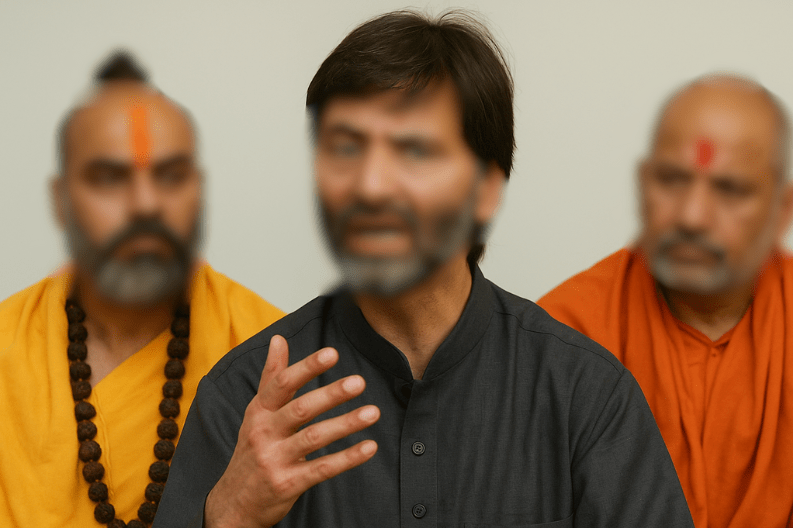Yasin Malik’s claims of visits by Hindu leaders have once again stirred controversy in Kashmir’s troubled history. In an affidavit filed on April 25, 2023, with the Delhi High Court, Malik said that two leaders from the Shankaracharya order visited him several times in Srinagar. He added that they even held press conferences together. Malik expressed surprise and asked why these leaders engaged with him despite the serious allegations.
Malik, who leads the Jammu and Kashmir Liberation Front (JKLF), described a sharp turn in his life. Within a week, he went from being treated as a “state guest” to being called a “dreaded terrorist.” The National Investigation Agency (NIA) sentenced him to life imprisonment, accusing him of illegal foreign funding and militant links.
He also recalled earlier violence in Kashmir. Authorities accused him of killing four Indian Air Force officers in 1990. He also faced charges for kidnapping Rubiya Saeed, the daughter of former Union Home Minister Mufti Mohammad Sayeed. During the 1990s, nearly 700,000 Kashmiri Pandits were forced to flee the Valley. This exodus changed the region’s culture and demographics. Many Pandits still blame Malik for their suffering.
Malik strongly denied these charges. He insisted that he gave up armed conflict in 1994 and followed Mahatma Gandhi’s path of non-violence. He said that he mourned the deaths of Kashmiri Pandits after 1996 and even joined their cremations. And he further claimed that he visited Pandit migrant camps in 2002 or 2007. He described the visit as an “emotional and tearful experience” where he listened to grievances and shared pain.
In his affidavit, Malik said a “wrong narrative” was spread by the media. He argued that if he had truly been guilty, the government would not have let him speak freely about Kashmir.
Malik also mentioned his meeting with Hafiz Saeed, the Lashkar-e-Taiba founder and mastermind of the 2008 Mumbai attacks. He stated that they met in Pakistan in 2006 as part of a secret peace process supported by Indian intelligence. He even claimed that former Prime Minister Manmohan Singh praised his peace efforts during that time.
The NIA dismissed these claims. They sentenced Malik to life imprisonment and also asked the Delhi High Court to raise his punishment to death. Officials argued that his role in separatist activities and militant funding made him a national security threat.
The controversy remains linked to Kashmir’s violent history. The massacres of Kashmiri Pandits, which killed more than 167 people, marked one of the darkest periods. These events, along with separatist movements, left communities with deep mistrust and lasting trauma.
Malik’s statements reflect the difficult balance between religion, politics, and separatism in Kashmir. His alleged ties with Hindu leaders, his denial of charges, and his claims of peace efforts continue to spark debate. For many, Yasin Malik’s claims of visits by Hindu leaders highlight the sensitive and tangled web of Kashmir’s past and present



